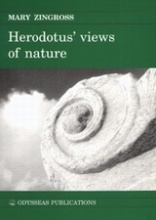Herodotus' Views of Nature
Herodotus the "Father of History", was a product of fifth-century B.C. Greece. That was a time of enlightenment, when nature could be viewed as separate from religion, resulting in unhindered speculation concerning the causes of natural phenomena. At the same time, belief in the gods persisted, and popular opinion attributed the processes of nature to divine causes. The writings of Herodotus exhibit the dual influence of these traditional beliefs and a progressive spirit of inquiry. This study seeks to discover Herodotus' views concerning nature and natural events, including such unusual biological phenomena as the Phoenix, the giant goddigging ants of India and the mythical Hyperboreans. An examination of this methodology, and of the extent of his geographical knowledge, enables us to determine his criteria for belief and to understand his concept of the "natural". Further, his presentation of physical phenomena (such as earthquakes and solar eclipses), as either "natural" or "supernatural -a duality which had hitherto been interpreted as uncertainty on his part- is demonstrated to be consistent and deliberate, and the criterion for his practice is established.
- ISBN978-960-210-332-6
- Ημ/νια Έκδοσης1998
- Σελίδες245
- ΔέσιμοΜαλακό εξώφυλλο
- Διαθέσιμες Γλώσσες
- Θεματολογίες Βιβλίου
- Συγγραφέας
- Εκδότης

